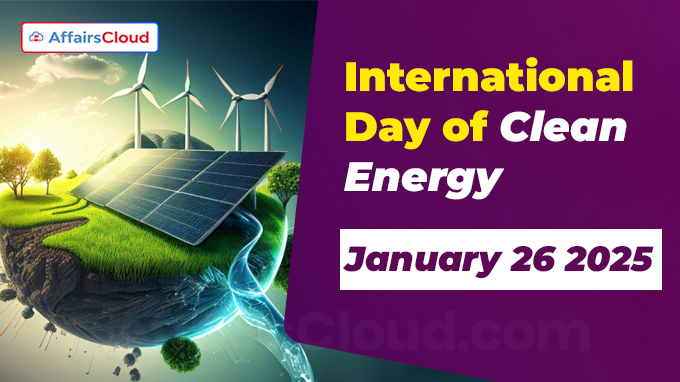 The United Nations(UN’s) International Day of Clean Energy is observed annually on 26 January across the globe to raise awareness and encourage action toward a fair and inclusive transition to clean energy, benefiting both people and the planet.
The United Nations(UN’s) International Day of Clean Energy is observed annually on 26 January across the globe to raise awareness and encourage action toward a fair and inclusive transition to clean energy, benefiting both people and the planet.
- 26th January 2025 marks the observance of the 2nd International Day of Clean Energy.
Note: Clean energy is crucial in reducing Greenhouse gas (GHG) emissions and ensuring that communities have access to reliable power sources.
Background:
i.On January 26 2023, the United Nations General Assembly (UNGA) declared the International Day of Clean Energy through resolution A/77/327, recognizing the need to accelerate the global transition to clean and sustainable energy.
- The 1st-ever International Day of Clean Energy was celebrated on 26th January 2024.
Significance:
i.The day holds significance as it coincides with the founding date of the International Renewable Energy Agency (IRENA), a global intergovernmental agency established on January 26, 2009.
- 26 January 2025 marks the 16th anniversary of the IRENA.
- IRENA supports countries worldwide in their Renewable Energy(RE) transitions, providing crucial data, policy guidance, and fostering international cooperation.
ii.The Day emphasizes the importance of clean energy solutions in combating climate change, reducing energy poverty, and ensuring equitable access to reliable energy for all communities.
Global Challenges:
i.Global Energy Poverty: 685 million people lack access to electricity, primarily in sub-Saharan Africa (more than 80%), limiting education, healthcare, and economic opportunities.
ii.Polluting Energy Sources: Continued reliance on fossil fuels perpetuates poverty and environmental harm.
iii.Transition to Clean Energy: Solar, wind, and hydropower are essential in overcoming these challenges and achieving Sustainable Development Goal 7 (SDG 7) – “Affordable and clean energy for all by 2030.”
- SDG 7 aims to ensure access to affordable, reliable, sustainable, and modern energy for all by 2030.
iv.Decarbonization: Shifting to renewable energy is critical for addressing the climate crisis and reducing greenhouse gas emissions from fossil fuels.
Key Facts:
i.A significant portion of greenhouse gases, which trap the Sun’s heat and warm the planet, comes from energy production, particularly from burning fossil fuels like coal, oil, and natural gas for electricity and heating.
ii.Fossil fuels account for nearly 90% of global carbon dioxide (CO2) emissions, the leading contributors to climate change.
- Over 75% of global greenhouse gas (Methane, Nitrous Oxide (N2O), Nitrogen Trifluoride (NF3) emissions come from burning fossil fuels for energy.
iii.Polluting fuels for cooking cause 3.2 million premature deaths annually; clean cooking can prevent many of these.
iv.Every USD 1 invested in renewables creates 3X more jobs than in the fossil fuel industry.
iv.Renewable sources such as wind, solar, hydro, and geothermal currently generate around 29% of the world’s electricity.
2025 Events:
i.The Dubai Electricity and Water Authority (DEWA), the United Arab Emirates (UAE), hosted 2 significant events ‘Renewables Talk’ and ‘Women in Diplomacy’ on the occasion of International Day of Clean Energy at the Mohammed bin Rashid Al Maktoum Solar Park in Dubai, the UAE.
ii.The event fostered collaboration and facilitated knowledge exchange in the clean and renewable energy sectors and also highlighted the crucial role of women in diplomacy and leadership in driving the clean energy transition.
iii.Key Attendees: Dr Amna Al Dahak, UAE Minister of Climate Change and Environment, Saeed Mohammed Al Tayer, Managing Director (MD) & Chief Executive Officer (CEO) of DEWA, Francesco La Camera, Director General(DG) of IRENA, HE Dr Nawal Al Hosany, and UAE Permanent Representative to IRENA.
Key Points:
i.UAE aims for Net Zero by 2050 and drives global clean energy initiatives in the Global South.
- DEWA aims to provide 100% clean energy for Dubai by 2050.
iii.Mohammed bin Rashid Al Maktoum Solar Park, the largest single-site solar park in the world based on the Independent Power Producer (IPP) model, set to exceed 5,000 megawatt (MW) by 2030, utilizing solar power, green hydrogen, and AI-driven solutions.
Note: As per the International Energy Agency’s Electricity report 2024, Global electricity demand is expected to rise at a faster rate over the next 3 years, growing by an average of 3.4% annually through 2026.
About International Renewable Energy Agency (IRENA):
Director-General(DG) – Francesco La Camera
Headquarters -Abu Dhabi, the United Arab Emirates(UAE)
Founded – 2009




